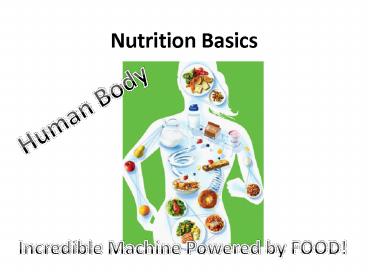Nutrition Basics PowerPoint PPT Presentation
1 / 15
Title: Nutrition Basics
1
Nutrition Basics
Human Body
Incredible Machine Powered by FOOD!
2
What makes up the food we eat?
Carbohydrates
Vitamins
Fats
Minerals
KEY INGREDIENTS
Proteins
Water
3
What is Digestion?
Digestion is the mechanical and chemical process
that breaks food down to release nutrients in
forms your body can absorb to use. It takes place
in the digestive tract, a hollow tube about 26
feet long. Through absorption, the nutrients move
into the bloodstream. This mostly takes place in
the small intestine.
http//highered.mcgraw-hill.com/sites/0072495855/s
tudent_view0/chapter26/animation__organs_of_digest
ion.html
4
1. Carbohydrates
- Main Source of Energy
- Forms of Carbohydrates
- Sugars (Simple Carbohydrates)
- Starches (Complex Carbohydrates)
5
Simple Carbohydrates
Sugars that are one and two unit structures,
which are chemically simple such as glucose,
fructose, sucrose, lactose, galactose, and
maltose. Noticewhat do all those words end
with? Words with this ending ose indicate
sugar and can assist you when reading food labels.
6
Complex Carbohydrates
- Carbohydrates with complicated structures ie.
starches - Examples are whole wheat flour
- Complex carbohydrates should supply about half
the calories in your diet however, the best
complex carbohydrates come from legumes,
vegetables, breads, pasta and cereals. - Best source for energy before playing sports or
other high performance activities
7
Facts about Carbohydrates
- Throughout history, people have satisfied their
sweet tooth with naturally occurring sugars,
such as fruit. - Health experts suggest that the majority of your
daily carbohydrate allowance be from complex
carbohydrates. - Bacteria in the mouth produce acid from
carbohydrate foods, especially sticky ones that
remain on the teeth. This acid can cause tooth
decay. Because of this it is best NOT to eat high
sugar foods before beds NOR at several intervals
throughout the day. When eating sugary foods,
eat a small serving at 1 time.
8
2. Fats (Lipids)
- Greasy substances that will NOT dissolve in
water. - Liquid fats are called oils.
- Provides energy and assists the blood with
distributing vitamins to the body - Primary sources cheese, dressings and salad
oils
9
3 Types of Fats
- Polyunsaturated Fat
- May help lower cholesterol levels
- Contained in vegetable oils such as corn oil,
soybean oil, safflower oil, and in seafood
- Monounsaturated Fat
- Sources olives, olive oil, avocado, nuts,
peanut oil, canola oil - Peanuts have Unsaturated fat
- Saturated Fat
- Contained in fatty meat, poultry skin, candy and
cake with coconut palm oil
When is a vegetable oil not an oil????? When it
is hydrogenated. This process turns oils into
solids. It is used by food companies to give
foods a longer shelf life. Examples are
shortening (Crisco) and margarine.
10
Fat Facts
- Excessive amounts of fat intake can lead to
obesity. - If you substitute animal sources of protein for
plant sources, the ANIMAL sources have MORE FAT. - Trans-fats raise blood cholesterol levels.
11
3. Proteins
Complete Incomplete Proteins Complete
Proteins contain all essential amino acids ie.
animal sources meat, cheese, chicken Incomplete
Proteins Sources from plant foods lack at
least one essential amino acid ie. dried beans,
lentils, peas, seeds
- LIFE CANNOT EXIST WITHOUT PROTEINS.
- Contribute to growth and protein and can help
your body repair itself. - Sources animals (such as meat, poultry, fish,
dairy), and plant sources (dry beans, peas, nuts,
vegetables, grains) - Consuming excessive amounts of protein will
convert the extra protein to fat and stores it in
fat tissues
12
4. Vitamins
- Complex substances found in a wide range of food
- Support chemical reactions that go on constantly
in your body
- Fat Soluble Vitamins
- Absorbed and transported by fat
- Includes Vitamins A, D, E, K
- Excess fat-soluble vitamins are stored in the
liver pass through urine large amounts in the
body can be damaging may cause diarrhea - Vitamin A promotes good vision.
- Vitamin D sources are sunshine and fortified
milk - Vitamin E an antioxidant protect cells from
damage esp. in lungs - Vitamin K helps blood clot
- Water Soluble Vitamins
- Dissolve in water pass easily into the
bloodstream during digestion - Only remain in body for a short time
- Are NOT stored in body excess amounts are
removed with waste products
13
Antioxidants substances that protect body cells
and immune system from damage that can be done by
harmful chemicals in the air or in food.
Cantaloupe and blueberries are 2 foods HIGH in
ANTIOXIDANTS!
14
5. Minerals
- Make up only 4 5 of your body weight
- Vital for good health
- Calcium
- Helps regulate blood clotting and nerve activity
- ESSENTIAL for strong bones
- Good sources collards, spinach, turnips,
fortified cereals - Excess amounts of calcium are stored in bones
- Excellent source is dairy products without
dairy products, bones become weak fragile
- Iron
- Essential for making hemoglobin substance in
red blood cells that carries oxygen to all body
cells - Anemia caused by insufficient iron in diet
symptoms are weakness, tired, short of breath,
pale, cold. - Spinach is high in iron.
- Excess iron is stored in liver.
- Potassium
- Known as an electrolyte mineral
- Helps muscles after heavy exercise so they will
not cramp
15
6. Water
- Water makes up 55 75 of human body!
- Water is critical for survival. People can live
6 weeks without food but only a few days without
water. - Has NO calories.
- Besides drinking water, it is also contained in
many foods especially fruits and vegetables (like
lettuce, celery, cucumbers) - Water helps with food digestion.
- Excessive sweating, dry mouth, dark-colored
urine, constipation and increased pulse rate are
symptoms of dehydration (insufficient intake of
water to the body)

